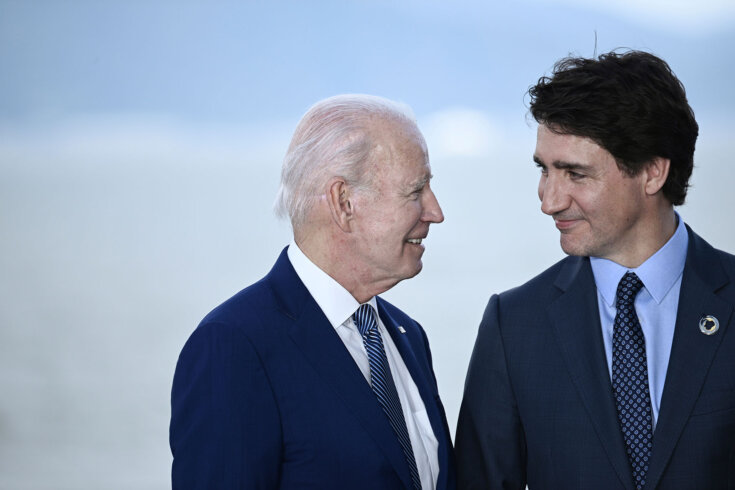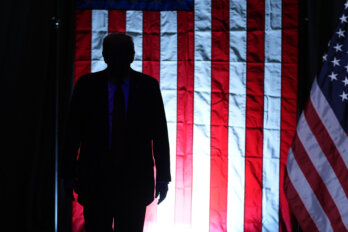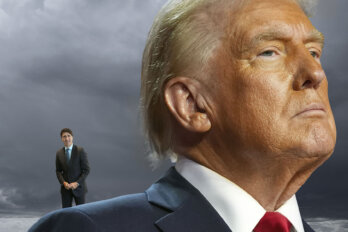Almost every day, I hear someone talk about how terrible things are right now. Whether it’s the crushing cost of housing, the escalating climate crisis, misinformation and rabid disinformation, the ongoing effects of the COVID-19 pandemic, or the humanitarian crisis in Gaza—the list is endless. Older family members on both sides of the Canada–US border shake their heads and make comments about how terrifying and screwed up their country is. My ninety-two-year-old great aunt has said she’s glad she won’t be around much longer, while others in their seventies have put it more bluntly: it’s a good time to die. These are off-the-cuff statements, but they always leave me with a sinking feeling.
These days, what’s considered terrible is often a point of contention. What I think is terrible about our current situation isn’t necessarily what others think, nor do we agree on who or what can rectify it. And yet, across the political spectrum, across demographics and borders, there’s a palpable sense that things are broken and we need real change—fast. It’s as if critical aspects of the world we thought we lived in have finally started to crumble. Chronic instability is at the heart of it, the recognition that we’re living through a turbulent time in history.
This desire for change is one reason why calls for US president Joe Biden and Canadian prime minister Justin Trudeau to not seek re-election feel so similar, though there are major differences between the two. Biden’s biggest liability is his age. At eighty-one, he’s part of the so-called Silent Generation, while Trudeau is quintessentially Gen X. Biden’s only been president since 2021, but he was vice president from 2009 to 2017, under Barack Obama. Trudeau’s been leading this country since 2015.
But both Biden and Trudeau embody an ethos and vision that are in stark contrast to the reality we’re facing. Both display a breathtaking confidence in their political prospects that borders on entitlement, as well as an inability to meaningfully address the severity of our current polycrisis. In Biden’s interview with ABC News on July 5, an interview that was supposed to calm nerves after his catastrophic appearance in the first presidential debate, Biden rejected any claims of pessimism. The New York Times called it “an exercise not just in damage control but in reality control.” Trudeau and his inner circle have similarly dismissed the storm brewing, especially after the recent by-election loss to the Conservatives in Toronto-St. Paul’s, previously a safe Liberal riding. As investigative journalist Justin Ling put it in an article for this publication, “if this government hopes to heal itself, Trudeau himself will need to appreciate—not explain away, or deflect, or tamp down—the anger that people are feeling.”
There is little about Trudeau’s and Biden’s personalities or recent politics that suggests radical change. Theirs is a reformist, pre-pandemic, pre-Trump, Obama-era vision that is outdated precisely because the pandemic and Trump’s presidency have altered so much in both countries. At its best, this vision is naive and misguided. At its worst, it’s dangerous and a form of gaslighting.
A poll of six battleground states, conducted between late April and early May, found that almost 70 percent of respondents said “the country’s political and economic systems need major changes—or even to be torn down entirely.” Only 13 percent of Biden’s supporters believe he would bring major change as the candidate to upend the status quo, while even many of those who dislike Donald Trump acknowledged that he represents a stark shift. Here in Canada, a 2023 poll found that 81 percent of Canadians want a change in government. But of that 81 percent, nearly a third say there isn’t an alternative to the Liberals they’re comfortable with. According to the CBC, some Liberal MPs, including Trudeau loyalists, believe the party needs “significant changes in cabinet, a shakeup of senior staff, a massive pivot on the policy front—or a combination of all three.”
Trump and Conservative leader Pierre Poilievre are polling better than Biden and Trudeau in part because both offer a vision of radical change, even though their vision of change shifts us even further to the right. During his presidency, Trump transformed the US Supreme Court, which has been on a rampage, tearing down precedents that will transform American society for decades to come. There are fears that Trump will wield the Insurrection Act and declare martial law in the US if re-elected, something he allegedly wanted to do during his first term. It’s hard to know what radical change would look like under a Poilievre government other than his usual vague talking points: kill the price on pollution, defund the CBC, make things more affordable, and protect “freedom.” But Poilievre is a politician who attacks the media and has flirted with conspiracy theories.
In the case of the US—though perhaps here in Canada too—there would almost certainly be unprecedented change to the democratic process. After all, Trump did try to overturn an election. But that radical-change mentality Trump and now Poilievre embody doesn’t extend to the root problem of what’s really making life hard for people: mainly, unchecked corporate interests and rising economic inequality as well as a climate crisis that’s literally killing people. These are the bogeymen neither Trump nor Poilievre show any willingness to seriously tackle, and which Biden and Trudeau have been relatively ineffective in tackling in the past.
We saw some of this play out in Europe. In the recent snap French election, voters demonstrated their fatigue with the centrist government of Emmanuel Macron. In the first round of voting, Marine Le Pen’s far-right National Rally party surged, while on July 7, a leftist coalition thwarted their victory. In the UK, Keir Starmer’s Labour Party won in a landslide, but as the Guardian noted, it’s not that voters were enthusiastic about Labour’s vision. They wanted to kick the Conservatives out. There was also low voter turnout, the second worst since 1885, according to the BBC. In anemic democracies like ours, where power sways back and forth between two parties, it’s hard to see this as an exciting outcome. It’s also hard to see some of the names floated as potential successors to Trudeau and Biden as candidates who would push for radical change, be they Kamala Harris, Mark Carney, or Chrystia Freeland. As Naomi Klein recently posted on X, “In this landscape, name recognition matters less than novelty/difference.”
But here’s the thing: big change is coming. In many respects, it’s already here. Scientists have been warning us for decades that we need a seismic shift in order to have a livable climate. Big tech has weaselled its way into almost every aspect of our lives. We just endured a global health emergency, and COVID-19 hasn’t gone away. The rich are richer, disinformation is rampant and stable, affordable housing has become a relic of the past. What Biden and Trudeau seem unable to grasp is that we live in a truly historic moment, marked by extreme events. There’s no going back to the eras they represent. To pretend otherwise is a fool’s errand. Let’s hope Biden and Trudeau realize this before more of the terrifying changes we’ve already seen rear an even uglier head.





